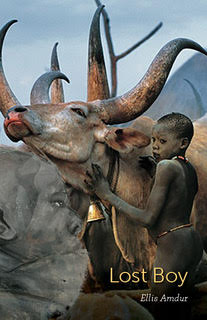Lost Boy

Full Title: Lost Boy: A Novel
Author / Editor: Ellis Amdur
Publisher: Edgework Books, 2021
Review © Metapsychology Vol. 25, No. 13
Reviewer: Marko Zlomislic, Ph.D.
The best works of fiction reveal truths that are concealed by the often repressive and oppressive structures of culture.
Ellis Amdur’s new book Lost Boy opens a portal into a horror-filled world where survival is a matter of skill, luck, resilience, courage, love and help from others who have found their humanity.
The “Lost Boy” is not a reference to Peter Pan’s companions. It refers us to the 20,000 boys of the Dinka and Nuer peoples who were orphaned during the Sudanese civil war (1987-2005).
These boys travelled by foot to neighbouring Ethiopia and Kenya seeking the shelter of refugee camps. Many were resettled throughout The United States.
Amdur’s novel tells the story of one “lost boy” named Essam as he makes his way through a landscape of evil.
I can’t reveal more than a bare outline of the plot because the action and drama stream towards an overwhelming dilemma. The lost boy Essam undertakes a journey that makes the quest of Odysseus look tame and boring. After many harrowing encounters with wild animals and humans who actively abuse him, Essam is rescued by a Jewish couple who take him to the United States. The trip to the States is fraught with danger and death. The passages that describe the family’s ordeal reveal the intensity of Amdur’s writing. As Essam takes his place in the new world working for a child protection agency, his past returns to haunt him and he has to decide how to deal with his own Trolley problem.
Amdur’s beautiful prose is direct and unsettling. It is visceral and authentic. How else is one to write about the presence of evil and violence that takes human form?
From my perspective, the book reveals the difficulty involved in responding to evil.
The following questions revealed themselves:
How does one move beyond the trauma and the hatred that harms oneself?
Can forgiveness take place for those who delight in doing evil?
How does one move on from horrific and life-altering events?
Can the damage or the injury to our estate; here understood as our position, condition and place ever be erased?
Are vengeance and revenge ever justified?
Do we heal our worlds by causing more pain?
How does the good fight against radical evil without becoming stained and smeared in blood?
Those of us who were injured by life and by other humans seek the halcyon which Amdur defined as “beautiful placid weather.” And yet the quest is anything but beautiful. It is terrifying. Here is a passage that stopped my reading. Amdur writes,
“We found scraps of clothes from corpses in other burnt villages, we ate soft mud to fill our bellies, we drank our own urine, ate bugs and garbage we found outside of villages we were too afraid to enter.”
We walk
We wander
To crawl
To life down
To sail
To touch the earth
And float on the water.
We are hunted by those who have little regard for our lives.
We are lost
Can we be found
Transformed
Renewed
To rest at home?
In actual peace?
How is this possible when others are abused beyond what the human heart can bear.
Amdur’s evocative book is startling. It was like an icy gust of wind that shook me to the core.
A few phrases from the book stood out for me to roll between my fingers:
What right have I to Heaven when the Devil stalks this world?”
“Just remember sometimes wounds never close. Pain feeds on pain.”
“I think there are only three tribes, anyway: good, bad and those who sway with the strong wind.”
Amdur’s novel shows us that real violence is not a game.
I think that Evil happens when harm outweighs help; when people who can do something, don’t do anything.
In the Lord’s Prayer or the Our Father, there is the line, “Deliver us from Evil”
How will such deliverance take place?
How do we protect ourselves from the worst?
I am sure that those in the death camps and gulags and trenches may have prayed something similar.
And yet the response was silence.
I think the prayer really needs to be changed to say, “Deliver us from the humans who harm us.”
My own encounter with the outcome of evil happened when I saw the exhumation of the mass grave near Vukovar.
At the grave, I did not think of Hamlet holding a skull, thinking “to be or not to be” even though hundreds of stinking corpses surrounded me.
No, I recalled the children’s song, “Ashes, ashes, we all fall down”, especially as I gazed upon the little skulls with bullet holes in them.
Amdur’s novel quotes the Sephardic lament, ” Durme, Durme, ijiko de madre (Sleep, sleep, mother’s little boy, free from worry and from pain, with the beauty of Shema Israel.” These words stopped my thinking.
Yes, I thought. This is what we long for.
Amdur’s novel gives us hope when catharsis and alchemy fail us.
Marko Zlomislic, PhD, Conestogac College
Categories: Fiction
Keywords: fiction, literature
